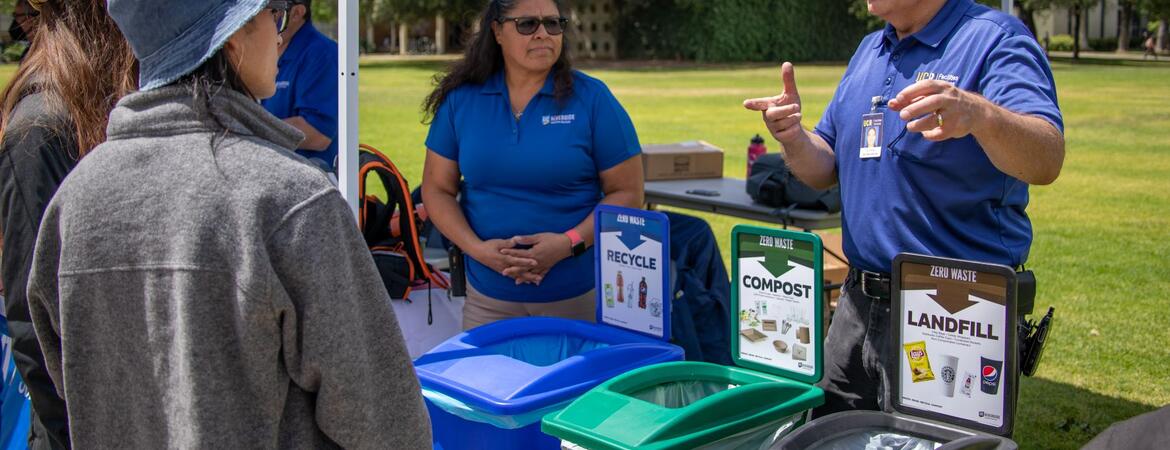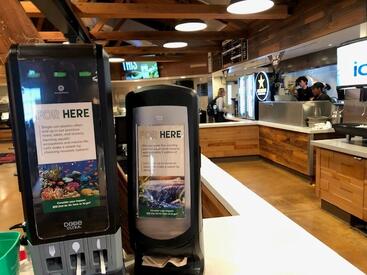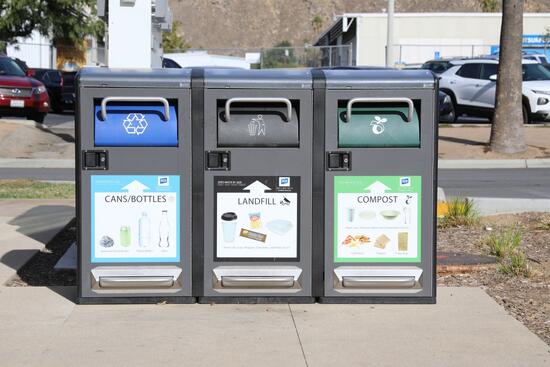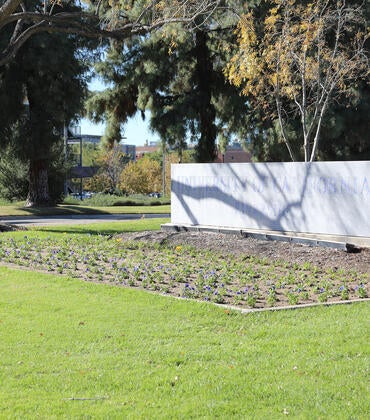As UC Riverside marks Earth Month with a number of activities, the campus is taking more steps to meet its zero-waste goal.
Facilities Services now diverts over half of the material previously sent to landfills to recycling and composting streams. A recent change in waste haulers has allowed the campus to recycle and compost even more material.
Composting will be offered later this year at UCR residence halls and campus apartments run by Housing Services, possibly by summer. Student housing complexes run by third-party operators such as North District and Dundee are also expected to offer composting by the end of summer.
Another new change is that the campus can now recycle large pieces of Styrofoam. The refuse and recycling team is educating the campus of the change, instructing customers to place Styrofoam into blue recycle bins. Although the product is not used by campus restaurants or stores, it is sometimes used in deliveries to student housing, labs, and offices.
UCR switched to Burrtec Waste Industries in November, in part due to the ability to expand the amount of waste the campus can divert to composting, said Hassan Ghamlouch, director of environmental and resources services for Facilities Services.
Another benefit to the contract with Burrtec is its location only 10 miles away in San Bernardino, reducing the travel distance and truck trips. The previous waste contractor’s facility is in Victorville.
The increased composting helps UCR meet recent state regulations requiring food waste be diverted away from landfills and customers be provided with recycling and composting bins.
“We’ve been doing a lot of organics already for many years, but we need to expand and build on what we’ve done so far,” Ghamlouch said.
An important part of the program is education and outreach to students in campus housing as well as employees in Housing Services, Ghamlouch said. Facilities Services has two student fellows with the College Corps program involved in that effort and is also working with the Office of Sustainability Services. Those efforts will continue as the composing program expands to more student housing this summer.
The Office of Sustainability has created a Zero Waste website that provides information and resources and has a presentation that it offers to groups by request, said Francis Mitalo, sustainability program specialist. It’s looking at organizing field trips to the Burrtec recycling facility for students interested in learning more about the process, he said.
Facilities Services is exploring with Burrtec whether additional waste products can be composted, such as animal bedding from campus labs. The company is testing samples to make sure there’s no contaminants in any animal bedding and it can be added to their compost stream, Ghamlouch said.
Similarly, Burrtec is testing whether certain containers and utensils used by Dining Services can be recycled or composted in a different stream from food waste. Dining Services now utilizes plant-based compostable food containers and bioplastic utensils and straws.
Gustavo Plascencia, the safety, sustainability, and projects manager in Dining Services, said changes in packaging and utensils are among many ways the department has introduced more sustainable practices at campus dining venues.
Over the years, it found that eliminating food trays and providing smaller plates reduced food waste, Plascencia said. The department also utilizes more efficient equipment, and in new venues like the Glasgow Residential Restaurant, incorporated design that promotes energy efficiency and reduced water use, he said.
The venues have easily accessible recycling and compost bins and feature messaging on posters and electronic message boards explaining how and why to do so.
Dining Services’ educational campaign includes tips and incentives promoting sustainable practices. Its “Sip and Save” program offers discounts to customers who bring in a reusable cup at select venues such as campus cafes when ordering a coffee or tea drink. At the Barn, the “For Here” campaign encourages diners to ask for reusable dining wear instead of take-out containers if they’re eating at the venue.
Other measures include donating surplus food to charities and repurposing cooking oil into biofuel.
Facilities Services plans to continue to expand its Bigbelly waste bins and central waste program to more of the campus, Ghamlouch said.
The rectangular Bigbelly bins, with separate ones for landfill, recycling, and compost, hold about three times as much as a regular bin because the waste is compacted. They are equipped with GPS and an email notification system that alerts crews when the bins are more than 50 percent full, reducing the number of trips needed to service them. The campus has 55 bins in 28 different locations and more will be added with new campus buildings, Ghamlouch said.
The central waste program, which has been introduced at select campus offices by request, places a small number of bins in a central location instead of placing several throughout that office. Ghamlouch said participants in the program end up taking more ownership of their waste and are more likely to separate them into proper bins when they have to dispose of them at a central location.
The Office of Sustainability is holding events throughout the month in advance of Earth Day on April 22. They include panels, tours, and workshops. Upcoming events include a vegan food fair and a flea market and sustainability showcase, both on April 17, a seed bombing on April 18, and chance to join in harvesting at R’Garden on April 27. On April 23, it will host its Academic Sustainability Retreat, which will include panels on the current state of the campus sustainability operations, curriculum, and research efforts.
More information on the month’s activities is available here.






